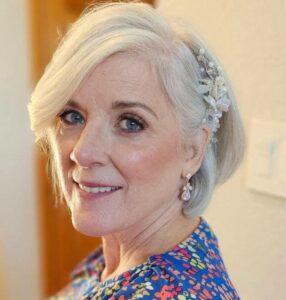Dressed in layers for Siberian wind, stuffed into a narrow seat near the back, I watch out the window for my stop. The trolley wheels rattle beneath my boots, clicking off the blocks as I venture farther than I would normally go on my own.
This unfamiliar territory lies west of the 3rd and 4th District by way of the Big Ring Road—where it drops south to a major intersection. There, the Hanamasa Restaurant sits next to a large bus stop and a proliferation of new shops, one of which, I hope, carries strings of Christmas lights.
The clouds hang as low as my spirits. I admit that I need the lights as much as the children. Even in my dreams, I find myself groping around in shadowy interiors for the light switch.
“Don’t you just love it here?” The question has haunted me ever since that American lady with the tasteful makeup and glossy fingernails asked it. That’s an easy question to ask in the middle of summer when everything is green and the sky is crystal blue and the air is pure and a glass of water doesn’t freeze on the kitchen counter.
I don’t know if it’s my tutor or just the nature of our relationship, but I feel like Eliza Doolittle who was condemned for “the cold-blooded murder of the English tongue.” Professor Higgins found her on the dirty streets of London and forced her into a linguistic make-over. Like her, I must conquer pure vowels. Only in the movie, the characters break out into song, and here we march through the streets in a gray fog and spend half the day looking for just one thing.
I see the Hanamasa. It’s time to get off. I stand near a group of shoppers and commuters at the back of the trolley to the screech of the brakes and the scraping call of the metal riding the electric line above me. Which one of us will be the first out the door? Let’s race.
I look around but there’s no sign of the shops others have told me about. Looks to me like there are mostly food markets. Through the tunnel entrance and under the low hanging ceilings, I search all the isles, but there’s nothing here but what I can find in every other shop: vegetables, bread, packaged instant coffee, waffle cookies and Russian layered cake with shortening for frosting.
Out in the open, I see apartment buildings and an auto body repair, but nothing that can pass for a store. I decide to wait for a bus that will take me to the Russian District on the east side. Push that man out of my way, squeeze past the older women, and find a place to sit.
This is where the main character—that would be me—should stand and sing, With a little bit, with a little bit, with a little bit of luck we’ll find some lights! With a little bit…
Oh, yeah. I better watch my bag. Everything bad that happens to me happens on a bus. There was the mugging, and the time my friend Diane was nearly trampled. She’d gone out of her way to give me a tour of the food shops and look what happened to her. She popped off the bus like a cork from a bottle of fermenting brew, and not a soul helped her up from the pavement. Tall and lovely Dianne, dusting herself off before I could get there. Oh no, I’ve stopped singing.
Brave woman, I will be like you. I will live above my circumstances, learn to laugh at myself and learn how to sing on gray days. Help me, Jesus.
Giving up on the lights is not an option. The Russian district comes into view with its
four-story apartments and playgrounds swept clean. However, the man who sits beside me is apparently drunk and has such a firm grip on the seat in front of us that I can’t get out.
I shake his shoulder and call him, “Akha.” Though he’s not my older brother, he’s due respect whether he’s stone drunk or not. He releases his grip on the seat, but his torso slumps lower until his arm wraps around my leg. I look up with pleading eyes to the bus conductor, the woman with the money bag, and she pulls at the man until he stumbles into the isle so I can leave.
This area is a little more familiar. I’ve been to the Russian school and to the hospital which houses a restaurant on the back that uses the blue and white table service. I’ve only been there once, but the meal was so good. I need to go back. The stuffed cabbage rolls with sour cream were amazing. I wonder where they buy the sour cream?
The soundtrack of my life picks up where I left off. With a little bit, with a little bit…
I spot a door with a sign that says магазин, mah-ga-zeen, in stenciled letters. That means store in Russian. Nearly frozen to the bone and hands too stiff to manage the door knob, I’m thankful another customer is on her way out. I step into a room of no more than four meters square. Oh, my. They have yellow split peas. I didn’t know there was such a thing. I think I’m smiling. Songs are in my head again. Split pea soup. Now wouldn’t that be loverly?
I wonder how different I will when the transformation is complete, I mean, when I can truly speak Mongolian? Will I be good for anything else? Eliza asked the same question. Maybe she would’ve been happier left where she was.
Glass half full or half empty? Look on the upside, you have a kilo of split peas in your bag.
One more bus stop, and I will be home. I stomp my feet to keep warm. .
That’s strange. The vehicle that pulls up is nearly empty. It’s just me and the conductor. I hand her fifty tugrik, and she gives me the meaningless slip of paper–proof that I’ve paid the fare, though there are a thousand littered beneath our feet and no one else around. She’s trying to talk to me, but I can’t understand her.
“Would you say that again more slowly?” I say in Mongolian.
“Something, something, drooga,” she says.
Drugs. She wants to sell me drugs! Mission training didn’t prepare me for this. I’ll turn her down politely and change my seat to the back, but she follows me. “Something, something, drooga” she says again.
Perhaps she’s not using Mongolian at all, but rather Russian. I guess I could look Russian to her, especially if I’m not smiling.
Smile. You’re a happy Christian woman with a song in your heart.
She asks about the drugs again. I look away. Smiling isn’t helping.
My last steps home are labored. I’ve been out for hours, and all I have to show for it is some shortbread cookies and split peas.
When I get to the top of the stairs, I note our apartment door has been left open a crack. We never leave our doors unlocked.
“Hello!” I call out, pushing the door wide and call out for my family again, “Anyone there?”
The corridor is quiet, so I turn toward the living room and hear shouts of “Merry Christmas” and “Surprise!” My husband and children jump up from the couch, and Mary the youngest screams with delight, “Look!”
Above me, a long string of brightly covered lights encircles the room near the ceiling and
finishes with a grand finale, a little Christmas tree with several small gifts wrapped beneath it.
“We went shopping too!” Pete yells.
In this world there is light. There is Dianne, and my family, and songs.
Before bed, I search through the dictionaries until I find the word I’m looking for. There in the pages marked with a д, I find that in Russian the word друг [droog] –means friend.



